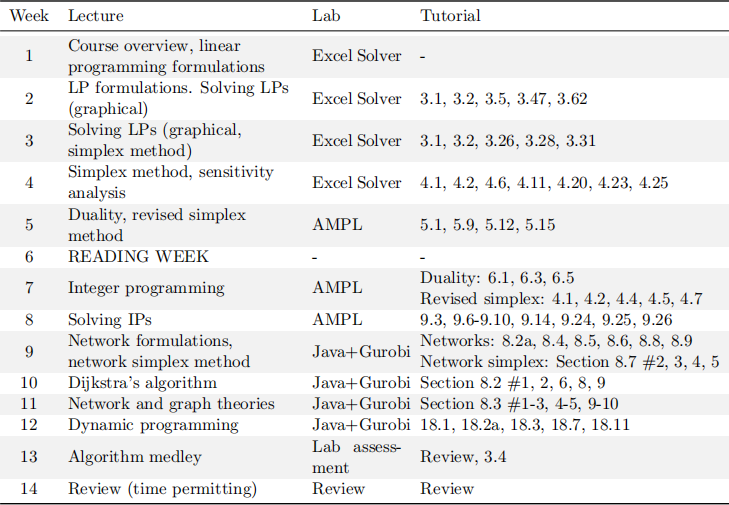MIE262: Operations Research I
MIE262: Operations Research I
Instructor: Prof. Dionne Aleman, MC321, [email protected]
Office hours1: Thursday 12:10-14:00 or by appointment, on Zoom:
https://utoronto.zoom.us/j/83455371743
Textbook: Winston, W.L. Operations Research: Applications and Algorithms, 4th edition, Thomson, 2004. ISBN 0534380581
Lectures: Monday 12:10-14:00; Wednesday 15:10-16:00
Tutorials: Section 1: Wednesday 16:10-17:00
Section 2: Thursday 15:10-16:00
TA: Hassan Anis, [email protected]
Labs: Section 1: Friday, 10:10-12:00
Section 2: Friday, 12:10-14:00
TA: Hamed Shourabizadeh, [email protected]
TA: Sharon Ferguson, [email protected]
Times and locations are accurate as of January 5, 2021.
Course structure
Lecture Deterministic optimization theory and implementation illustrated by examples
Tutorial Examples, examples, examples
Lab Optimization software for linear and integer programming problems
Attendance Optional
Because the lectures will not always focus on just linear and integer optimization, the content in the lectures and labs may not always directly correlate with each other. However, by the end of the semester, you should be able to solve any problem presented in the lecture using the tools learned in lab. Lab requires Java in the second half of the semester.
COVID arrangements There is no in-person content for this course this semester. All lectures, labs, and tutorials will be held live online via Bb Collaborate on Quercus and recorded. Any formal instruction during lab/tutorial will be recorded and posted, though ad hoc discussion may not be.
Course goals
• Learn to recognize real-world problems that can be solved using math
• Learn how to develop accurate mathematical models for decision making
• Learn theoretical basics of deterministic linear, integer, and network mathematical models
• Learn to analyze mathematical model solutions to infer the impacts of changing scenarios
• Learn how to solve optimization problems with the ubiquitous Microsoft Excel
• Learn how to use sophisticated optimization packages (AMPL, Gurobi)
Grading The lecture and lab have graded components.

Quizzes and exams:
• Individual assessments—no collaboration or outside assistance allowed
• Open book, open note
• Questions will test understanding, not regurgitation
Requests for re-grades: Requests for re-grades must be made directly to Prof. Aleman in person during office hours within one week of receiving the grade. Simple addition errors in calculating the mark can be reported to Prof. Aleman by email.
Student responsibilities (COVID edition)
If you attend the live lectures:
• Ask questions!!!
– Use the “Raise hand” button in Bb Collaborate and wait until I call on you (like an in-person class). If no one is talking (or if I don’t notice the raised hand), just turn on your mic and ask your question. It is okay to interrupt me to ask questions.
– Remember to turn on your mic to ask a question.
– You can also ask questions by typing them into the chat area. If I don’t notice the typed question, please turn on your mic and let me know.
• Use Bb Collaborate’s emoticons to indicate if you are confused or if you want the lecture to go slower or faster.
– If you are confused, it would be helpful to ask a specific question or state exactly why you are confused.
– If you use the happy or sad faces, it would be helpful if you could tell me why you are feeling that way so I can better address your concerns (or keep doing what is making you happy).
• Mute your microphone when you are not speaking.
• Turn on your camera. It’s not mandatory, but you will feel more engaged and more willing to participate and ask questions. It also makes for a better teaching environment, which in turn makes for a better learning environment for everyone.
In general:
• Do not post any content from this course (lectures, documents, etc.) anywhere without Prof. Aleman’s explicit permission.
• With the exception of questions that relate to you personally, do not email me with course questions. Instead, post them to the course discussion board so they can be answered faster and benefit the entire class.
• Please turn on your camera if you attend office hours. It’s not mandatory, but it will make for a better experience.
• If you have exceptional personal circumstances affecting your ability to perform well and meet deadlines, let me know.
• If you feel disconnected and disengaged due to the online format, try the following:
– Attend the live lectures and turn on your camera.
– Come to office hours and say hi, even if you do not have any questions.
– Send me an email and we can discuss your situation.
– Use the discussion board to form study groups or social groups.
Schedule of topics The schedule of topics below is subject to change without notice.

2021-02-08